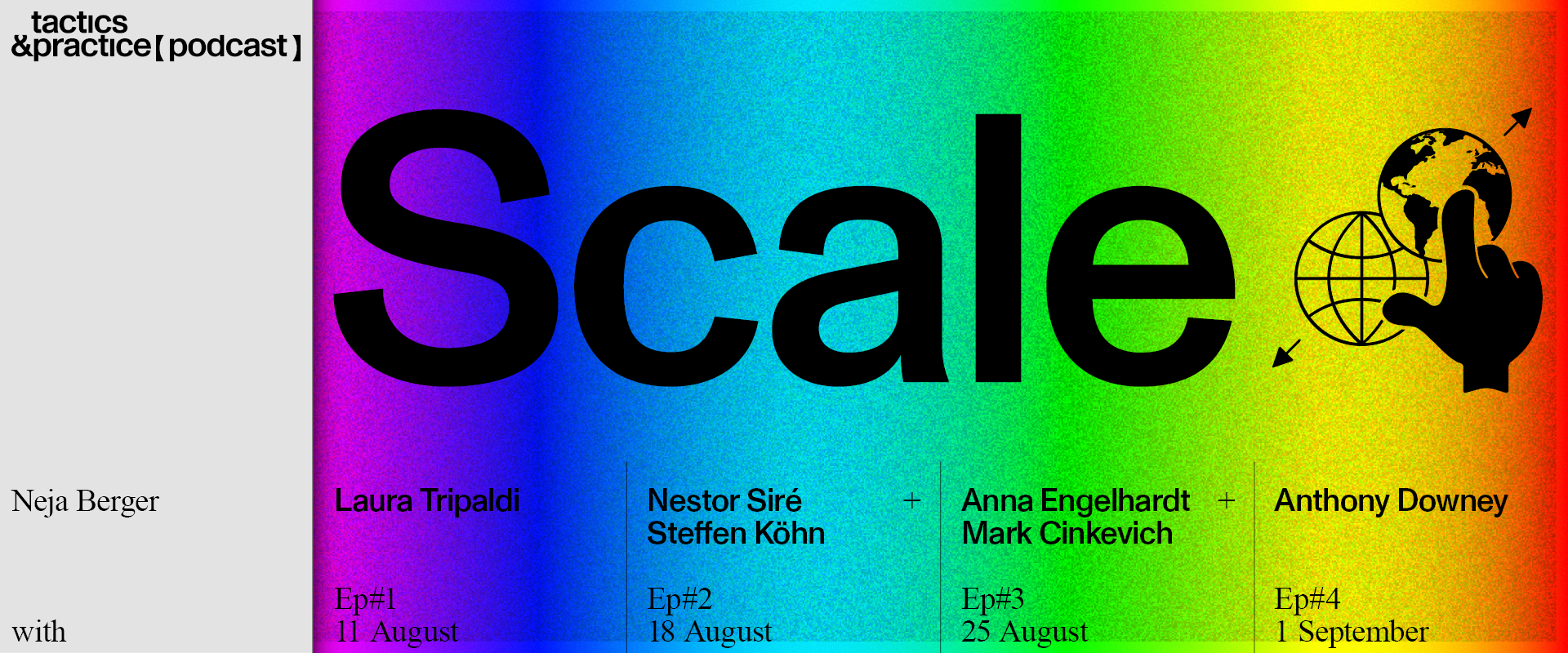Tactics&Practice [podcast]: Scale
Each year Tactics&Practice takes on a specific theme. The 14th edition, held in Ljubljana in the spring of 2023, was devoted to the theme of scale. Journalist and researcher Neja Berger followed the entire programme and interviewed some of its protagonists for the channel’s first miniseries.
Most of the phenomena that affect the social world and underlie the ways in which social powers – economic, political, ideological and military – establish and act take place in realms that are much larger or smaller than the human scale. In this podcast series artists, anthropologists and academic researchers engage in a dialogue about their latest projects in order to make us think outside the human scale. Listeners will be acquainted with intelligent materials, demonic energy infrastructures, local informal networks of data distribution and autonomous weapon systems, and will thereby discover that new paradigms and scales are needed to better understand – and possibly subvert – the world we live in.
Scale | Ep.#1: Matter as a Subject [w/ Laura Tripaldi]
On the nanoscale, materials can appear as vibrant, lively subjects that can even have political implications. Laura Tripaldi, author of Parallel Minds: Discovering the Intelligence of Materials (Urbanomic, 2022), is an expert on nanotechnology who worked in industrial research before shifting her focus on philosophical and theoretical fields. She has been exploring our relationship to technology and materials we use everyday, and has proposed a different perspective on non-human and non-living entities, challenging us to consider them as active rather than passive matter.
Scale | Ep.#2: Alternative Networks in Cuba [w/ Steffen Köhn & Nestor Siré]
Alternative community-based data distribution networks on the local scale have emerged in Cuba as a consequence of the economic sanctions imposed on the country in recent decades. German anthropologist Steffen Köhn and Cuban media artist Nestor Siré shed light on the unique materiality and significance of these networks, built to overcome the limitations of internet access in Cuba. In the current capitalist, consumerist form of internet, characterised by closed platforms, we are fed content chosen for us by algorithms, whereas informal infrastructures allow their users, makers and content creators to be the protagonists of their own choices – and allow us to envision decentralised, non-commercial and collective interactions on the web.
Scale | Ep.#3: Russian Neocolonialism as Demonic Possession [w/ Anna Engelhardt & Mark Cinkevich]
Infrastructures of abnormous scale are the materialisation of neocolonialism. Megabridges, power plants, military bases are means of dispossession, invasion, extraction perpetrated by bigger countries upon smaller sovereign states. Media artists and interdisciplinary researchers Anna Engelhardt and Mark Cinkevich have developed a method called “applied demonology”, which combines CGI, mediaeval demonology and satellite investigation to interrogate the spectre of colonial violence. They have used this approach to shed light on the way Russia has possessed Ukraine, Belarus and Syria like a demon that parasites its host and always breaks its promises.
Scale | Ep.#4: Neocolonial Extraction and Surveillance [w/ Anthony Downey]
The concept of scale is related to mapping, which is intrinsically related to colonisation and neocolonial military practices. Anthony Downey, Professor of Visual Culture in the Middle East and North Africa (Birmingham City University), draws a historical line from the development of cartographic devices and photogrammetry in the 18th and 19th centuries to the neocolonial extraction of data through AI-powered models of hyper-surveillance. Utilised for training neural networks and refining algorithms, these methods of data extraction effectively redefine the future of kinetic and non-kinetic warfare. Programmed within such systems, the operative and rationalising logic of algorithms are, Downey proposes, complicit in increasingly reductive determinations of what constitutes life and death in conflict zones.
Scale | Ep.#5: Reality as a Scalar Effect [w/ Jussi Parikka]
To complexify the notion of scale and to expand it, both historically and beyond human perception, allows us to think about scale within different academic, design and artistic vocabularies. Writer and professor in Digital Aesthetics and Culture at Aarhus University, as well as visiting professor at FAMU (Prague) and Winchester School of Art (UK) Jussi Parikka has extensively researched the cultural histories and archaeologies of media and has, over the past years, focused even more on environmental media. In a recent text for Aksioma, he has addressed scale as the middle of a meddling bundle of forces, showing that the concrete techniques in which scale comes to existence and functions are ontogenetic, i.e. they bring worlds into existence. That’s why scale is inherently entwined with power and politics in very detailed ways, which is something he addresses in his recently published book Operational Images as well as in the slightly earlier co-edited volume in Photography Off the Scale. This fifth episode marks the culmination of the series: it is an intriguing dialogue aimed at reframing the concept of scale and at connecting all the insights and perspectives discussed in the previous episodes.
Podkastom lahko sledite na aksioma.org/podcast in na platformah Soundcloud, Spotify, Google in Apple Podcasts.
COLOPHON
Host: Neja Berger
Recording and editing: Neja Berger
Audio Mix: Staš Kramar
Music: Gašper Torkar
Scale podcast series
Curated by Janez Fakin Janša
Produced by Marcela Okretič
for Tactics&Practice#14: Scale
Production:
Aksioma | Institute for Contemporary Art
Ljubljana, 2023
Part of
Tactics&Practice
konS – Platform for Contemporary Investigative Art
___
The project konS ≡ Platform for Contemporary Investigative Art was chosen on the public call for the selection of the operations “Network of Investigative Art and Culture Centres”. The investment is co-financed by the Republic of Slovenia and by the European Regional Development Fund of the European Union.
